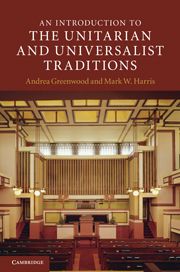Book contents
- Frontmatter
- Contents
- Acknowledgements
- A note on names
- Chapter 1 Introduction
- Chapter 2 Beginnings
- Chapter 3 Great Britain
- Chapter 4 From revelation to reason
- Chapter 5 From reason to intuition to freedom
- Chapter 6 A religion for one world
- Chapter 7 Congregational polity
- Chapter 8 Worship
- Chapter 9 Sources of faith
- Chapter 10 Science and ecology
- Chapter 11 Architecture, art, and music
- Chapter 12 Education and social justice
- Chapter 13 Current issues, new directions
- Selected bibliography
- Index
- References
Chapter 8 - Worship
Published online by Cambridge University Press: 05 June 2012
- Frontmatter
- Contents
- Acknowledgements
- A note on names
- Chapter 1 Introduction
- Chapter 2 Beginnings
- Chapter 3 Great Britain
- Chapter 4 From revelation to reason
- Chapter 5 From reason to intuition to freedom
- Chapter 6 A religion for one world
- Chapter 7 Congregational polity
- Chapter 8 Worship
- Chapter 9 Sources of faith
- Chapter 10 Science and ecology
- Chapter 11 Architecture, art, and music
- Chapter 12 Education and social justice
- Chapter 13 Current issues, new directions
- Selected bibliography
- Index
- References
Summary
Worship is a necessary response to human life. Among Unitarians and Universalists, that response is unusual among the Western religious traditions because it is never presumed that the worshipper is paying homage to a deity, and so worship does not need to be oriented towards the supernatural. Unitarians often focus on the root of the old Anglo-Saxon word “worship” (weorthscipe) or “worth ship,” which means to reflect upon or celebrate things of worth in the natural world – an idea, a value, or a vision of how the world could be.
At a conference for the Unitarian Association for Lay Ministry in 2008, Martin Gienke of Bury St. Edmunds, England asked how Unitarian worship was different from other forms. He suggested that, “At best, our worship is unpredictable, varied and diffuse – it takes place in congregations free to choose their own patterns.” He also wondered, “Is our worship too word-centered, do we lack symbols, do we contain enough emotion?” These are questions that concern Unitarians and Universalists all over the world. The liberal religious movement generally does not follow prescribed liturgical patterns, but rather celebrates a “free” tradition when it comes to orders of worship, with each congregation choosing its own forms. This means that generally no established prayer book is followed, but services are “open” to include a variety of materials that the minister or service leader chooses. While Unitarian services in Transylvania follow an exclusively Christian format, many Unitarians elsewhere have services with readings that are not biblical, but may come from literary or humanist sources, or other world religious scriptures. The question of whether the services have too little emotion has been around ever since Ralph Waldo Emerson accused the rational Unitarians of being “corpse-cold.”
- Type
- Chapter
- Information
- An Introduction to the Unitarian and Universalist Traditions , pp. 147 - 165Publisher: Cambridge University PressPrint publication year: 2011

